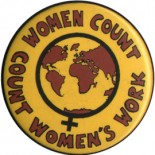Crossroads has been a staple in our Germantown community for nearly two decades, known to provide expansive services to low-income women, especially women of color. The scope of your services … Continue reading
Women Count! / Women in Dialogue
Philadelphia: Box 11795 Phila PA 19101 215-848-1120 San Francisco: Box 14512 SF, CA 94114 415-626-4114 womencount@womenindialogue.us
Valuing Caregiving Work
History
Since 1995, Women Count! has monitored the progress (or lack thereof) by governments to implement the decision made by governments at the UN Fourth World Conference on Women in Beijing to measure and value unwaged work and count its value in “satellite accounts” of the gross domestic product. This was considered by many to be one of the most far-reaching decisions to come out of the Beijing conference. We provide expert information including speaking at national and international conferences.
Family Caregiving
Studies show that 2/3 of seniors prefer care at home. Less than 10% prefer a nursing home or living with an adult child. Care at home can be safer with better health outcomes than care in facilities.
- According to an AARP study, more than 95% of seniors want to stay in their homes as long as possible, even if they need help with day-to-day activities.
- The CDC has found there is a strong risk of hospital-acquired infections among the elderly in nursing care facilities.
- Clinical results are comparable or better with fewer complications when home care is provided to individuals with chronic conditions such as pneumonia, diabetes, or COPD.
Our programs address the need for the work of caregivers to be recognized, valued, and supported, including with resources, assistance, and compensation. The AARP estimated the economic value of unpaid family caregiving in the US to be $450 billion in 2014. We publicize ways to access resources and get support for caregiving and avoid impoverishment and hardship. We are organizing a support group of seniors/families over our center’s Healthy Lunch Program. The group will be sharing practical experiences on navigating the system, help research, and produce a “how to” written or video guide including input from health experts on the value of family caregiving and programs that support it, launch the guide with a hands-on legal clinic to help seniors/families with eligibility, and look for ways to increase support for family caregivers. Meeting over a healthy lunch also helps with isolation and poor nutrition.
Pay Equity
We are also concerned about the wages, benefits, and working conditions of women in waged work, who earn on average only 72% of men’s wages. For women of color, the situation is even worse: Black women earn 62%, and Hispanic women 52%, of men’s average wage. Women have consistently identified this as among the most important issues, and Women Count! has hosted meetings and forums that include women’s groups, community organizations, and labor unions, as well as collected information on women’s wages and conditions of work. The Pay Equity Now! initiative is one of the projects based at our Crossroads Women’s Center.

